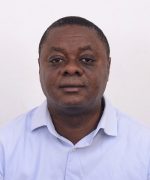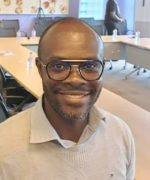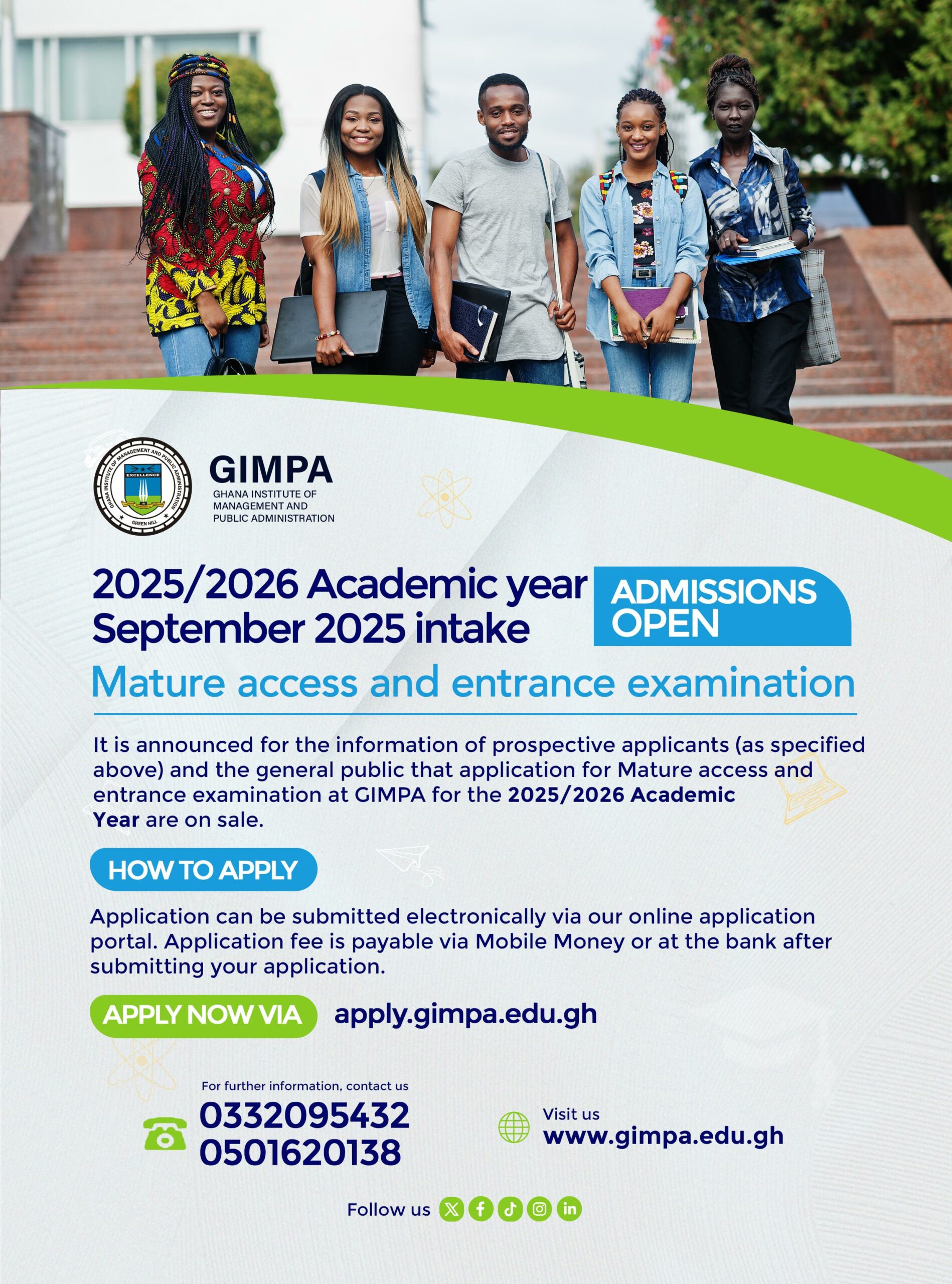Nana Assyne is a lecturer of Software Engineering at the Department of Computer Science, School of Technology – GIMPA. He is also a software startup coach. He holds PhD in Information Technology (Computer Science) from the University of Jyväskylä, Finland; a Master of Science in Information Technology (Software Engineering) from the Lappeenranta University of Technology, Finland; a Bachelor’s Degree in Business Information Technology from Haaga-Helia University of Applied Sciences, Helsinki, Finland. Also, Nana holds a Professional Certificate in Pedagogical Studies in Vocational Teacher Education from Haaga-Helia University of Applied Sciences, Helsinki, Finland.
Prior to working at GIMPA, Nana worked with Haaga-Helia University of Applied Sciences – Finland as a student/teacher assistant, Program Coordinator – Professional Mentorship Program for Foreigner, Think Africa-ry – Finland, Nsense Oy – Finland as a software developer, CEO, and lead Developer for BanzyTek – Finland, L&T Oy – Finland & RTK Oy – Finland as a supervisor and Sekondi-Takoradi Metropolitan Assembly – Ghana as head of MIS Unit. Nana has over 10 years of teaching experience in software engineering courses at the university level, professional level development, and supervising thesis including supervising thesis at Haaga-Helia University of Applied Sciences – Finland.
His area of research is on software engineering with a specific interest in software engineer’s competencies and software startup engineering, software security, and AI. He is a member of the Software Startups Global Research Network (https://softwarestartup.org).
Master’s Level Course, GIMPA School of Technology, GIMPA, Accra, Ghana
Bachelor’s Level Course, GIMPA School of Technology, GIMPA, Accra, Ghana
Peer reviewed journal articles
Lecture Notes in Business Information Processing
Peer reviewed book chapter
Peer reviewed conference papers
ORCID link: https://orcid.org/0000-0003-0469-6642
Nana Assyne is a lecturer of Software Engineering at the Department of Computer Science, School of Technology – GIMPA. He is also a software startup coach. He holds PhD in Information Technology (Computer Science) from the University of Jyväskylä, Finland; a Master of Science in Information Technology (Software Engineering) from the Lappeenranta University of Technology, Finland; a Bachelor’s Degree in Business Information Technology from Haaga-Helia University of Applied Sciences, Helsinki, Finland. Also, Nana holds a Professional Certificate in Pedagogical Studies in Vocational Teacher Education from Haaga-Helia University of Applied Sciences, Helsinki, Finland.
Prior to working at GIMPA, Nana worked with Haaga-Helia University of Applied Sciences – Finland as a student/teacher assistant, Program Coordinator – Professional Mentorship Program for Foreigner, Think Africa-ry – Finland, Nsense Oy – Finland as a software developer, CEO, and lead Developer for BanzyTek – Finland, L&T Oy – Finland & RTK Oy – Finland as a supervisor and Sekondi-Takoradi Metropolitan Assembly – Ghana as head of MIS Unit. Nana has over 10 years of teaching experience in software engineering courses at the university level, professional level development, and supervising thesis including supervising thesis at Haaga-Helia University of Applied Sciences – Finland.
His area of research is on software engineering with a specific interest in software engineer’s competencies and software startup engineering, software security, and AI. He is a member of the Software Startups Global Research Network (https://softwarestartup.org).
Master’s Level Course, GIMPA School of Technology, GIMPA, Accra, Ghana
Bachelor’s Level Course, GIMPA School of Technology, GIMPA, Accra, Ghana
Peer reviewed journal articles
Lecture Notes in Business Information Processing
Peer reviewed book chapter
Peer reviewed conference papers
ORCID link: https://orcid.org/0000-0003-0469-6642
Nana Assyne is a lecturer of Software Engineering at the Department of Computer Science, School of Technology – GIMPA. He is also a software startup coach. He holds PhD in Information Technology (Computer Science) from the University of Jyväskylä, Finland; a Master of Science in Information Technology (Software Engineering) from the Lappeenranta University of Technology, Finland; a Bachelor’s Degree in Business Information Technology from Haaga-Helia University of Applied Sciences, Helsinki, Finland. Also, Nana holds a Professional Certificate in Pedagogical Studies in Vocational Teacher Education from Haaga-Helia University of Applied Sciences, Helsinki, Finland.
Prior to working at GIMPA, Nana worked with Haaga-Helia University of Applied Sciences – Finland as a student/teacher assistant, Program Coordinator – Professional Mentorship Program for Foreigner, Think Africa-ry – Finland, Nsense Oy – Finland as a software developer, CEO, and lead Developer for BanzyTek – Finland, L&T Oy – Finland & RTK Oy – Finland as a supervisor and Sekondi-Takoradi Metropolitan Assembly – Ghana as head of MIS Unit. Nana has over 10 years of teaching experience in software engineering courses at the university level, professional level development, and supervising thesis including supervising thesis at Haaga-Helia University of Applied Sciences – Finland.
His area of research is on software engineering with a specific interest in software engineer’s competencies and software startup engineering, software security, and AI. He is a member of the Software Startups Global Research Network (https://softwarestartup.org).
Master’s Level Course, GIMPA School of Technology, GIMPA, Accra, Ghana
Bachelor’s Level Course, GIMPA School of Technology, GIMPA, Accra, Ghana
Peer reviewed journal articles
Lecture Notes in Business Information Processing
Peer reviewed book chapter
Peer reviewed conference papers
ORCID link: https://orcid.org/0000-0003-0469-6642






© 2024 – GIMPA
Built with love by Creer Studio.
